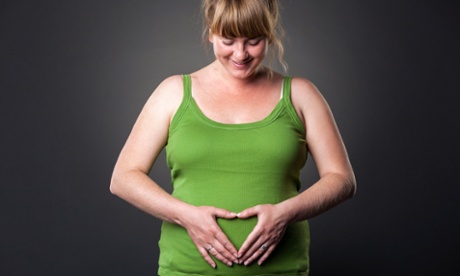
If there's one thing that people with experience of depression fear most in life, it's depression coming back. The thought of being dragged again into a moribund swamp of emptiness, ennui and self-hatred is terrifying. Depression often returns, so it’s handy to learn how to fend off the black dog before you find yourself staring at the back of its open throat and being knocked to the ground. It can take a hell of a long time to get up.
To this end, the National Institute of Clinical Excellence (Nice) has issued new guidelines to GPs treating women with depression. It suggests doctors ask female patients whether or not they want children as a prelude to discussing the complications which can arise when women with depression – or history of it – become pregnant.
The guidelines, however, have been deemed a violation of privacy; an NSA-style eavesdropping-via-the-bellybutton on potential life. One in three women are affected by mental health problems, according to the World Health Organisation (WHO). We know that a strong link exists between women with prior mental health conditions and both antenatal and postnatal depression (although postnatal is the more publicised); and the risk of mental health relapse in pregnancy is significant. Therefore I don't agree with Roger Goss of Patient Concern that GPs should "mind their own business". Their business is our health.
Indeed, anything that helps broaden women's understanding of the risks of pregnancy relative to their mental health is positive. One of the first things a psychiatrist said to me when explaining my diagnosis of bipolar disorder, was that I would have to assess aspects of my lifestyle and moderate them to best deal with the lifelong illness. He reeled off a list of things that would have to be looked at in order to live a stable life: "Alcohol intake, caffeine consumption, the choice of whether to have children or not …".
“What do you mean about the alcohol intake?” I asked, wide-eyed and panicked, paying no attention to the bit about kids. “I can still drink, right?" (Reader, I was 20). The truth is, living with depression, bipolar disorder or any other mental health condition is tough. And pregnancy is the biggest change a woman’s body will undergo. The possibility of the two together is not something to be ignored, and it would be remiss of mental health professionals and care providers to not raise this.
Suicide is a leading cause of death to women around childbirth in the UK, India and China, and most other developed countries. In the 2008 BBC documentary The Secret Life of the Manic Depressive, the late Gaynor Thomas, a bipolar and puerperal psychosis campaigner, was filmed in conversation with specialist Dr Ian Jones, who explained the severe risks of relapse during pregnancy. Gaynor was shown deciding against having a second child.
There is also the issue of certain medications affecting pregnancy and fertility. Women in their 20s are not advised to take the anticonvulsant mood stabiliser sodium valproate, for instance, as it is known to reduce fertility (I was not prescribed it for this reason). Antidepressants are generally not recommended during pregnancy, due to links with miscarriage and foetal heart conditions, especially with older tricyclic drugs which preceded SSRIs. There is evidence which suggests a mother’s depression while pregnant might affect the brain structure of her child, in particular development of the amygdala, responsible for emotional control. And as we know, mental health conditions have traceable genetic causation (in particular bipolar disorder and depression).
These guidelines aren’t about warning women off having children, or about being nosey, patronising or scaremongering. They are about "spotting what is not normal for each individual woman and ensuring she receives the treatment that is right for her", as Prof Mark Baker, director of the Centre for Clinical Practice, put it.
Should I ever want to start a family, I know that there would be a lot of things I'd have to consider. Coming off my medication would be a huge deal for me; relapse would be a grave concern. I would also worry about passing on the condition. I would feel guilty: who wants to hand down hell? I would also be anxious about not being able to look after my child in times of my own ill-health. These are all things that women with mental health problems should be encouraged to discuss, in order to make an informed decision. I for one think it’s nice that Nice are doing just that. More than nice, in fact. It will save lives.

